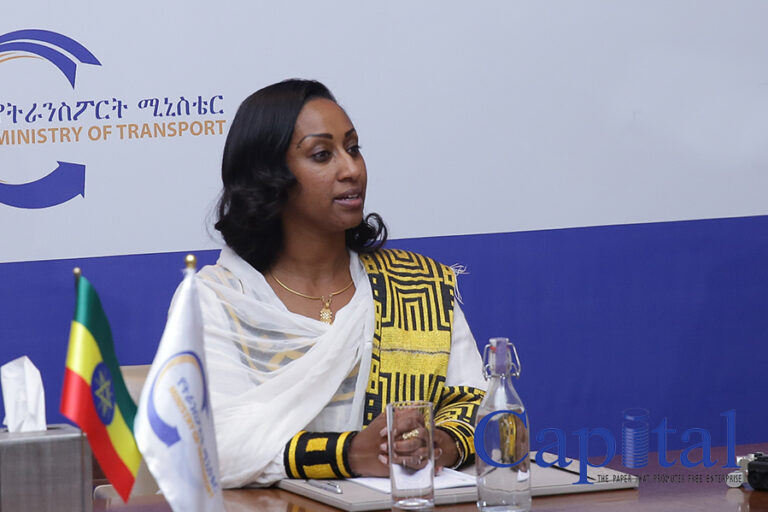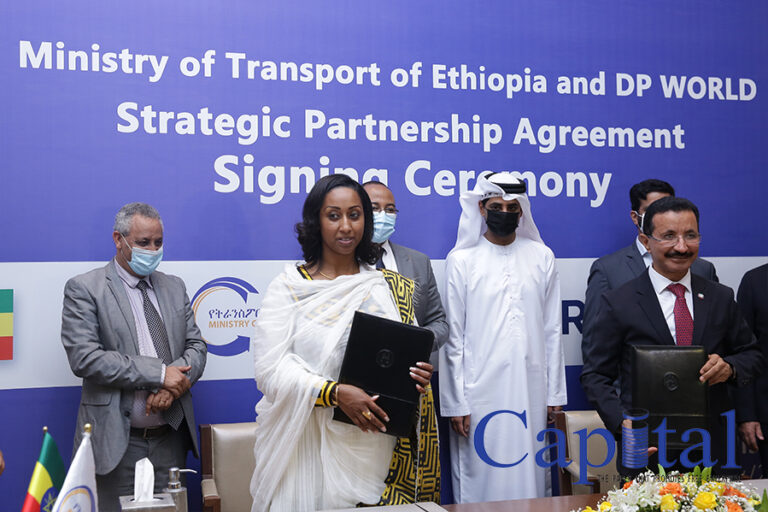Ethiopia plans to build five additional corridors in the coming ten years. Based on the ten years perspective plan, the transport sector has six strategies, 22 sub strategies goals and 98 interventions for the logistics sector.
For the implantation of the strategy, the Council of Ministers’ have formed a National Logistics Council that is chaired by MoT and includes Minister of Trade and Industry, Ministry of Revenue, Ministry of Agriculture, Ministry of Finance, National Bank of Ethiopia, Customs Commission, Investment Commission and representative of the private sector logistics actors.
As one of the target area, the Council is looking at an alternative port service in order increase the overall logistics service efficiency, Dagmawit Moges, Ministry of Transport told Capital, elaborating that in the coming ten years the ministry has planned to build about 5 port corridors.
“By increasing number of alternative ports and corridors it could be a simpler way in addressing the issues all over the country,” the transport minister emphasized.
Recently, the country has started to use port Berbera as another alternative corridor to the Djibouti port which accounted for 99 percent of flow of goods in and out of the country which declined to 92 percent when using Berbera, highlighted Dagmawit foretelling that there are certain activities on the works to start using Port Sudan in addition.
Besides building corridors the government is considering several interventions which will be included in the logistics strategy including management of port which will be determined by the ten year transport plan.
Dagmawit expounded that the ten year development plan on the transport sector will be crucial for other economic development as well since logistics is interlinked with economic development.
The transport sector development has included diversified sub sectors in different investment. To attain the goals, government under its transport sector policy revision has decided to open up the highly closed logistics and other transport sub-sector in different schemes including; joint venture, public private partnership and full investment.
On May 6,2021 the Ministry of Transport have signed the first Memorandum of Understanding (MoU) in on the logistic service with DP world to determine the potentials for developing logistics infrastructure and the provision of end to end logistics services along the corridor to unlock major economic benefits for Ethiopia.
The transport sector development in general is expected to consume 3.2 trillion birr or USD 75 billion in the coming decade, while the sector that is mostly preserved for public and domestic investors will expand its playground to foreign investors in different schemes.
From the 3.2 trillion birr, 69.55 billion birr will be covered by the money collected from the service provided by the sector and the rest will be financed by the government budget, which is about 2.2 trillion birr, loans of 582 billion birr and foreign aids of 164.5 billion birr. The intervention of the private sector including foreign investors has also been considered as a major source of investment in the sector.
Similarly, a further increase of the number of dry ports from 8 to 11 in 2030 is expected. Similar developments such as building cargo vehicles terminals to increase the number from 1 to 23 and 4 new one stop borders to increase the number are in the works.
Ethiopia’s future transport outlook
THE TIMES THEY ARE A CHANGING
The ways of the world used to be somewhat predictable. With all the powerful global institutions employed as formidable tools (particularly after WWII), the modern world system looked invincible. Changes that were effected on the global scale during the last eight decades were, for the most part, still predicated on the anchoring logic of this overbearing system, i.e., accumulation! The aberration of the various ‘Sovietisms’ did not last long. We say aberration because behind the USSR’s grandstanding there wasn’t much in the way of sustainability, both in the realm of the natural as well as the social. Understandably, the main overriding concern of ‘Sovietism’ was the protracted project of ‘catching up’ (with the West). Because of this, the system became rigid with many built-in undesirable features. Around the time of the USSR’s collapse, Maoism endorsed the accumulation logic with gusto, and tried to outdo the west, without much qualm about potential consequences, social or otherwise!
The triumph of ‘liberal democracy’ conjoined with the ‘free market’ ideology did not bring much to the global sheeple (human mass). What this conundrum affected, amongst other things, was the visible diminishing of states’ power. Actual political power shifted in favor of monopoly capital and its subsidiaries, human or otherwise. Attendant results are now coming in droves! Persistent economic polarization is giving rise to political populism. The visibly rising movement of global populism is deemed dangerous by the power that be (TPTB). To counter this worldwide movement, the ‘deep state’ is devising new ways of controlling the aspirations of the sheeple. From the look of things, the transition to a more egalitarian and a more democratic world order might not be all that smooth. For example, in the sphere of trade alone, long established entities such as the WTO (world trade organization) NAFTA, etc., are undergoing serious reversal, surprisingly, by the very same powers that set them up in the first place! Trade wars have already ensued between major operators of the world system (US vs. China, US vs. EU, etc.) Please note: going from trade war to shooting war is not a strenuous project to the walking ape. All in all, things are progressing not as planned, at least from the point of view of entrenched interests. The system is on the verge of nonreversible bifurcation. This will spell trouble to all and sundry, not only to those who had it good for a long time so!
The military alliance of the Atlantic-ists, NATO (Europe + North America) is also encountering challenges, mostly from the sheeple and their ascending politics of populism. The current US administration feels the Europeans states are not contributing enough to sustain the organization. The US is even threatening to close down some of its bases in Europe. The German sheeple is taking this threat rather positively. A good portion of the German sheeple prefers the US to completely shut down its military bases in Germany and Europe. On top of that, the ‘Russian Bogeyman’ doesn’t seem to be working; at least as planned. A number of the newly emerging ‘populist’ parties in the West seem to have quite different views in regard to Russia, the wars in the Middle East, etc. Unless western politicos fall back to prudence and experience to manage the delicate global situation, the South China Sea might well see military engagement between the two super powers of our world system (between the fast declining hegemon, USA and the fast rising economic power, China). The Persian Gulf, Gulf of Eden, the Hormuz Strait and all the other critical naval routes might also see some actions between major powers.
The Italian populists in power are contemplating to institute a number of new policies/ideas during their reign. For a start, they want to create new media outlets that do not depend on revenues from advertisers (read monopoly capital and subsidiaries). Not surprisingly, (at least to us) this is one of our long- standing proposals. We have been purveying this idea, free of charge, for years! Since this same idea is now coming back to Africa by way of the Mediterranean (from the North), it might finally gain some currency on our continent. In addition, the Italian populists in power do not want Brussels/EU to dictate their major policies. The mavericks are even flirting with the idea of creating their own local currency, to have some leeway to alleviate their dire economic situation. Even NATO is not something they look at favorably. Incidentally, this is also true with a good portion of the European sheeple. Surprisingly, even leaders of the UK’s Labor Party have expressed the same negative sentiment towards the belligerent Atlantic military alliance. To the perceptive, BREXIT is just one more populist expression directed against the heavy handedness of the elites and their institutions, like EU. Unlike Greece or even Spain, Italy is a major economic power. Italy is still a member of the G7 countries. Whatever Italy decides to do, will have major repercussion, not only in Europe. Expectedly, the global mainstream media, or what we regularly call the ‘paid media’, is not willing to sufficiently cover what is cooking in Italy and in some of the other countries of Europe where populism is gaining ground. Beware! The European sheeple, just like its brethren elsewhere, is clearly in a rebelling mood!
The 2016 Nobel Prize winner in literature, (the most prestigious prize of the global establishment) who actually refused to accept the award in person, (because of prior arrangement, probably with his regular shoeshine boy, ha, ha) saw it coming way back in the early 1960s:
‘The line it is drawn
And the curse it is cast
The slowest one now
Will later be fast
As the present now
Will later be past
The order is rapidly fadin’
And the first one now ‘ll later be fast
For the times are changing
Bob Dylan. Good Day!
Global logisticians called in to unlock trade routes
One of the leading global logistic solution providers gets to Ethiopia to develop the Ethiopian side of the road linking Ethiopia to Berbera into one of the major trade and logistics corridors of the Country’s international trade routes.
On May 6, 2021, the Ministry of Transport signed the first Memorandum of Understanding (MoU) on the logistic service with DP world to determine the potentials for developing logistics infrastructure and the provision of end to end logistics services along the corridor to unlock major economic benefits for Ethiopia. Dagmawit Moges, Ethiopia’s Minister of Transport, and Sultan Ahmed Bin Sulayem, Group Chairman and CEO of DP World have signed the agreement.
“Utilizing the Berbera corridor will surely have a potential to make Ethiopia a front runner in logistics operations since the industry is expected to play the leading catalytic role to the national growth,” said Dagmawit Moges Minister of Transport, adding that, “Ethiopia aims to diversify its port access facilities and services to improve its trade corridor access routes. Perhaps the development of this Corridor will not only meet with the growing demand of Ethiopian’s international trade, but it would also enhance our Nation’s capacity in utilizing our existing major corridor both in terms of volume of trade and efficiency.”
By investing up to 1 billion dollar, over the next ten years in developing the supply chain infrastructure along the corridor it is proposed that the Parties would establish a joint venture logistics company to perform logistic operations from origin to destination, DP World will offer services from Ethiopia up to Berbera Port, while for imports, from the port of loading to the delivery of shipments in one of the dry ports in the hinterlands or the final destination of the consignees.
Services include dry ports, silos, warehouses, container yards, cool and cold chain depots, freight forwarding and clearing activities and infrastructure developments including implementation of the IT infrastructure and technology.
“The development of the port will create new jobs, attract new businesses and investment along the corridor, as well as diversify and strengthen the country’s access to international trade by having a direct, seamless and efficient link between Ethiopia and Berbera Port,” said Sultan Ahmed Bin Sulayem, Group Chairman and CEO of DP World.
The road infrastructure that will connect Berbera Port to Wajaale at the border with Ethiopia, funded by the Abu Dhabi Fund for Development and the UK’s Department for International Development, is expected to be completed by the end of 2021. The road will link the existing modern highway on the Ethiopian side and will further position Berbera as one of the key trade gateways in the region and will be one of the fastest and most efficient routes for Ethiopian transit cargo.
DP World has committed to investing up to US$442 million to develop and expand Berbera port, with the first phase nearly completed. Further work is already underway on expansion of the quay to 1000 metres which will increase capacity to two million TEUs, operated by 10 quay cranes.
DP World launches e-commerce platform to simplify global reach
DP World launches, a global wholesale e-commerce platform opening a new digital trade corridor for Ethiopia.
“DUBUY.com brings efficient, reliable B2B e-Commerce to Ethiopia marketplace with end-to-end supply chain solutions for the continent and beyond, Enables market access for local and international companies,” stated Mahmood Al Bastaki, Chief Operating Officer of Dubai Trade World adding that, “DUBUY.com is an online marketplace that will help to unlock access to global markets for small and medium-sized Ethiopian enterprises, with fulfilment through DP World’s worldwide ports and logistics network.”
The commercial platform will serve as an online marketplace that will help give access to global markets for small and medium-sized Ethiopian enterprises, through DP World’s worldwide ports and logistics network reach.
DUBUY.com began operations in Rwanda with plans for rapid expansion across Africa and beyond. Ethiopia is the second largest market in Africa by population size and the platform will aim to capitalize on that.
The combination of DUBUY.com with DP World’s physical logistics infrastructure and data-driven logistics solutions will solve some of the key challenges to the growth of e-commerce on the continent, including reliable fulfilment, secure financial transactions, and the movement of goods.
DUBUY.com represents a new model of trade in Africa, designed to strengthen its existing potential and open businesses and markets organically by enabling trade and supplying innovation. This technology allows home grown businesses to become international manufacturers and exporters by linking them with new markets in Africa and the rest of the world.”
The DUBUY.com platform offers a one-stop-shop, ensuring all transactions on the site are secure, from onboarding only trusted suppliers through to integrating leading payment service providers. There are pre-negotiated, heavily discounted shipping tariffs in place, with weekly console boxes moving between origin and destination with guaranteed transit times and incentivized shipping costs. The shipping methods are also customized according to the scale of each transaction and the urgency of shipments. This all adds up to create a platform which is agile, responsive and will enable Ethiopian entrepreneurs to fully benefit from the advantages of increased access to world markets.










